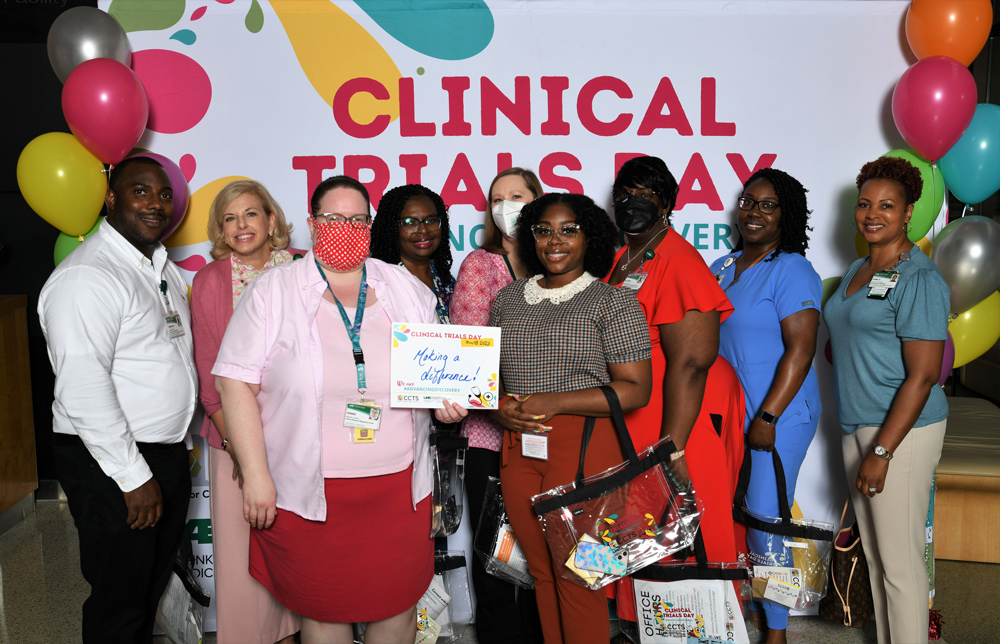 On Thursday, May 18, UAB celebrated Clinical Trials Day, with more than 400 people attending the in-person event. This day celebrates the progress that has been made in clinical research along with the individuals who have committed themselves to their work of making these advancements possible.
On Thursday, May 18, UAB celebrated Clinical Trials Day, with more than 400 people attending the in-person event. This day celebrates the progress that has been made in clinical research along with the individuals who have committed themselves to their work of making these advancements possible.
Since 2020, UAB has averaged nearly 300 new clinical trials annually. Clinical trials are pivotal in advancing treatments and moving science forward, ultimately helping practitioners provide better care and increasing patient outcomes.
Rigorously designed clinical trials represent the gold standard method of advancing the development of new detection, treatment, and prevention strategies to improve health. Through careful examination of safety, efficacy, effectiveness, and benefit, clinical trials provide a pathway for testing novel interventions that may lead to life-saving options and meaningful improvements in the quality of life for our patients.
"Clinical trials are really what differentiates us. Enrolling patients in clinical trials advances the standard of care for almost every disease,” said Anupam Agarwal, M.D., dean of the UAB Heersink School of Medicine. He added that clinical trials are patient focused first and foremost. “We need to continue to lead the way not just for our city and state, but for the region. A major cause for us is to continue to grow our clinical trials effort so we can bring novel treatments and new ways for our patients to get better faster and with better results."
 UAB’s clinical trials had more than 6,000 participants in 2022. Currently, UAB supports more than 1,000 open trials (all sponsors). The institution launched over 300 new clinical trials in 2022 and is on track to exceed that count in 2023.
UAB’s clinical trials had more than 6,000 participants in 2022. Currently, UAB supports more than 1,000 open trials (all sponsors). The institution launched over 300 new clinical trials in 2022 and is on track to exceed that count in 2023.
Over the past ten years, UAB’s portfolio of trials has quadrupled in expenditures, representing a major fraction of the institution’s clinical research enterprise. This growth is consistent with national trends, which will see year-over-year investments increase by 5.4%, approaching $36.3 billion by 2030. During this time, we expect further expansion of innovative trial designs, computational breakthroughs, and patient-centric approaches.
2023 Clinical Trial Achievements
Alan Tita, M.D., Ph.D., and his team announced the findings from their multicenter, randomized trial, the Chronic Hypertension and Pregnancy Project (CHAP), which enrolled 2,408 pregnant women with a primary aim to evaluate the benefits and potential harms of pharmacologic treatment of mild chronic hypertension in pregnancy. This study provided evidence that managing blood pressure in cases of less severe hypertension led to better pregnancy outcomes with no increased risk for the child.
The study was recognized by the national Clinical Research Form with the 2023 Top Ten Clinical Research Achievement Award as well as the David Sackett Trial of the Year award from the Society for Clinical Trials.
Another accomplishment for the year includes the FDA approval of Trofinetide, a drug for treating Rett Syndrome, following a randomized, double-blind, placebo-controlled, 12-week study. It is the first ever to treat this rare genetic neurologic disorder.
Trofinetide stands on the shoulders of critical scientific insights enabled through the rigorous definition of the natural history of Rett Syndrome led by Alan Percy, M.D., as part of his NIH-funded Rare Disease Clinical Research Center, established at UAB 20 years ago. Building on long-standing scientific leadership as a center of excellence in Rett Syndrome research, UAB and Percy played a significant role as a recruitment site for this pivotal trial.